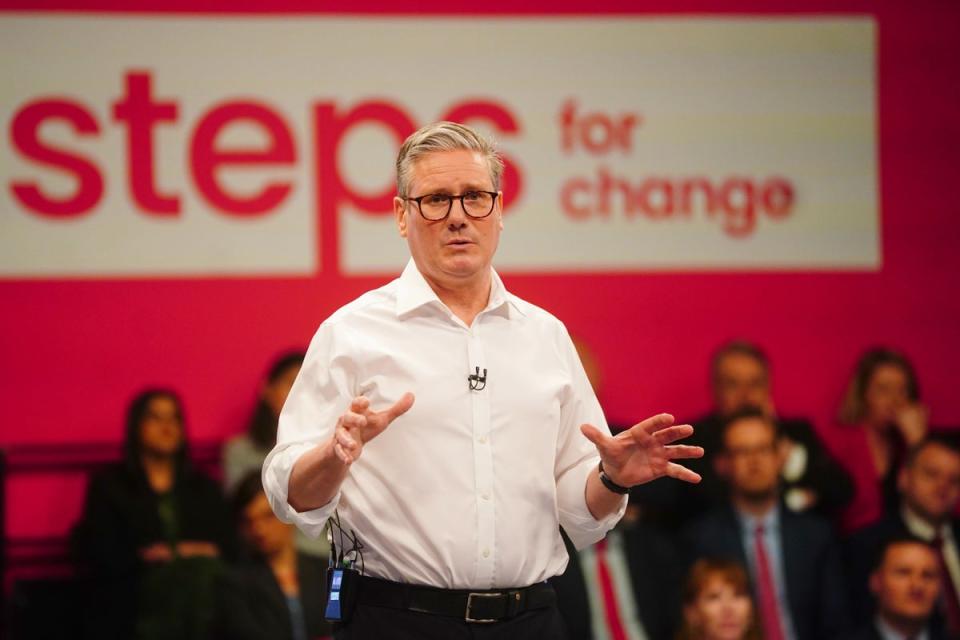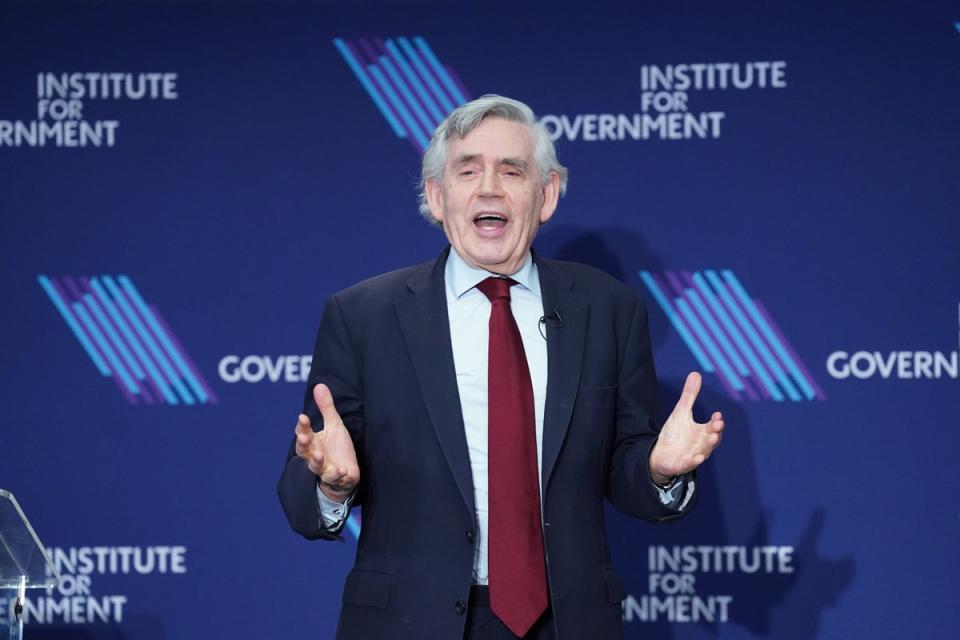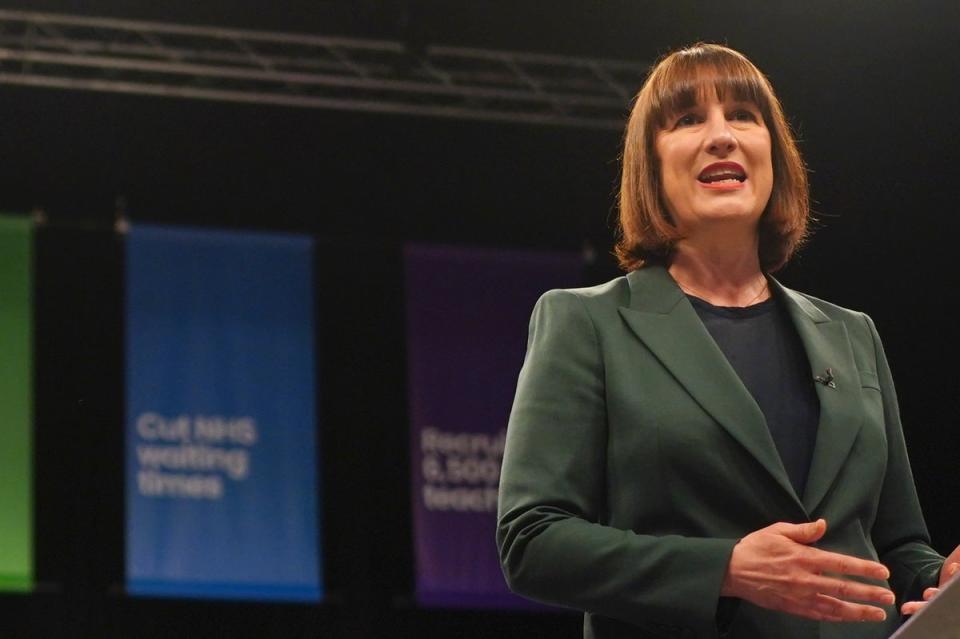Keir Starmer dons his election boots to tramp all over Tory territory
Sir Keir Starmer donned his election boots as Labour launched its bid to seize back 10 Downing Street after 14 years in opposition with a 48-hour blitz of battleground seats.
In a presidential-style event in Thurrock, Essex, the Labour leader set the tone for the next six months of solid electioneering with a “stability” first message to voters who turned their back on the party after previously supporting Tony Blair.
With a confident performance surrounded by his top team, Sir Keir laid out his six “first steps”, aping the five pledges of New Labour in 1997 which swept Blair to power.
Among his supporters were two former Tory donors including Boots boss Sebastian James, an Old Etonian friend of Boris Johnson and David Cameron, who endorsed Labour and praised Sir Keir’s focus on economic growth and Britain’s high streets.
The second, Rob Boughton, runs one of the biggest developers in the South East; his company has donated nearly £1m to the Conservatives since 2017.
But he told the audience that Labour’s message on economic stability and growth had won him over.

The launch was followed by the biggest splurge of advertising spending by Labour since 2019 and the Labour leader and his shadow cabinet members hitting battleground seats previously held by Labour but which had turned to the Tories in the last 15 years.
Shadow ministers, billboard ads, and ad vans targeted key seats which Labour need to win back in areas such as Wolverhampton, Bassetlaw, Swindon, Leigh, Doncaster, Barnet, Newcastle, Aldershot and Thurrock.
The Labour leader denied that he was trying to be “a new Tony Blair” but his message appeared to be an attempt to rebuild the middle England coalition which won New Labour three straight elections.
Thurrock is also symbolic of the sort of voters Mr Starmer’s party appears to want to win over. It was, until recently, a threeway split between the Tories, Labour and Nigel Farage’s Ukip. Labour has just won back the council in the Essex seat in the recent local elections.
The event was introduced by deputy leader Angela Rayner, despite continuing questions about her former home and whether she broke electoral law in describing it as her primary residence.
Sir Keir’s message appeared to be pitched towards former Tories, with a pledge of economic stability, tough action on crime, and protection of borders, as well as more traditional Labour messages on tackling the crisis in the NHS and improving educational standards.
But while Sir Keir was questioned over a lack of ambition in his “first steps” and a refusal to take on big battles like ending the two-child benefit cap, he insisted that he was not scaling back Labour’s ambition.
He said the first stage of the strategy was to recognise the scale of defeat Labour suffered in 2019 and to change the party, and the next was to expose the government as incompetent, which he said had been assisted by the behaviour of several of their prime ministers.

“We’re not reducing the mission,” Sir Keir said.
“I don’t accept that they’re small first steps,” he continued to insist in a Q&A with the media. “If you’re waiting on an NHS waiting list, this is a change that makes a massive difference.”
He also emphasised the need for economic stability, which Labour’s campaign material says will require “tough spending rules”.
The Labour leader said he had recently spoken to a couple in Wolverhampton who had decided they could not afford to have a second child as a result of the fallout from Liz Truss’s 2022 mini-Budget.
“I’m not prepared to let an incoming Labour government ever do that kind of damage to working people,” he told the audience.
Sir Keir sounded a note of caution about his willingness to make pre-election spending commitments when asked if he would rethink Labour’s position on the two-child benefit cap as a means towards ending child poverty.
He and the Labour leadership had been shamed by former prime minister Gordon Brown and, surprisingly, right-wing Tory leadership hopeful Suella Braverman, who both called for the cap to be ended in the last week.
The Labour leader said ending child poverty would be “central” to his party in power, but added: “What I can’t do is make promises that I can’t deliver on.”
Asked during an interview with ITV later how quickly the public would be able to feel the difference of Labour’s policy agenda, Sir Keir said: “On day one.”
He insisted that while some changes would take longer to implement, others like getting rid of some planning restrictions and the commitment to introduce a Border Security Command to tackle small boat crossings could be done straight away.
Other steps include measures to invest in the NHS, education and policing, the formation of a new national energy company, and the promotion of economic stability.
The Labour leader cast an informal figure at the event, appearing without a jacket and tie and with his shirt sleeves rolled up, in contrast to the other high-profile party figures in attendance.
The rally cut a contrast with Rishi Sunak’s election launch at Policy Exchange earlier this week where he gave his speech alone, and the focus was on defence and security in a perilous world.
Sir Keir avoided mention of foreign policy in a constituency which had backed Brexit very strongly while he was trying to unpick the referendum result.
He sought to portray the first steps as only a part of Labour’s wider programme for government, but also attempted to manage expectations about what the party could achieve in power following the UK’s recent economic difficulties.

Speeches came from members of Labour’s shadow cabinet, including chancellor Rachel Reeves and health secretary Wes Streeting.
Conservative party chair Richard Holden claimed Sir Keir’s launch was “devoid of any plan for Britain”, while Commons leader Penny Mordaunt compared him to the Beatles song “Nowhere Man”.
She told the Commons: “There’s nothing there. There’s no vision, no plan, no principles on which to steer by, which is why this pledge card will go the same way of all the others.”
The SNP meanwhile claimed Sir Keir had made no mention of Scotland, though Labour is expected to make distinct campaign launches in both Scotland and Wales in coming weeks.
The Child Poverty Action Group urged him to set out more ambitious plans to tackle poverty.
The charity’s chief executive, Alison Garnham, said: “A child poverty reduction plan is essential, but scrapping the two-child limit would have to be step one.”


